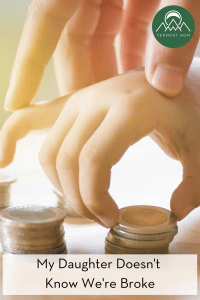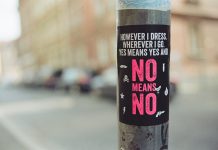This evening, my front bumper went up on a curb as I exited a gas station. My night vision is horrible, and I’m still getting used to the darkness after turning the clocks back for daylight savings. The scrape of metal and loud cracking noise made my entire body tense up. Normally, I don’t drive in the dark, but I am working my second job shopping and delivering groceries.
It’s my side hustle, as they call it. I’m single, in my forties, and co-parenting a young kid; I feel too old and too tired to be hustling, but here I am. I do it not only to pay the bills but also to uphold the feeling of security and identity with which my daughter navigates this world.
See, my daughter doesn’t know we’re broke.
I backed off the curb, and my front end landed with a thud and another crack—the sound of my bank account bottoming out between paydays.
I’ve been hitting the pavement hard lately, running around every nook and cranny of this county spending other people’s money so I can have a fraction of my own. My experience as a gig worker has me constantly thinking about socioeconomics. I navigate my way from one class of neighborhood to another—from trailer parks to McMansions, from government-subsidized high rises in the city to luxury condominiums in the suburbs, while reflecting on my place in this capitalist country.
The two class extremes of my customers reflect the national trend of a widening gap between rich and poor, the shrinking middle class, etc.
I shop for poor folk because they don’t have access to reliable transportation. I shop for rich folk because—well, they have access to everything, so why not? I get just as lost on unmarked gravel roads trying to find a mobile home in the back woods as I do in the disorienting private drives and cul-de-sac dead ends. I rely on my phone’s navigation app to tell me where to go, and at the end of the night, I get to plug in one final address: home.

It wasn’t all idyllic. Like most places, domestic violence and alcohol abuse were embedded in the blood of every generation but rarely spoken about. My current apartment is one of the drabber and more rundown buildings in the neighborhood—built in the early 1900s, it is the same place my mother and her friends used to refer to as “the Blocks.” The Blocks was where the poorest of the immigrant families lived—the ones who were reputed to be on welfare, whose children ran around with dirty faces and even dirtier vocabulary.

My young daughter and I often walk past the very house where my great-grandmother once sat in her floral nightgown, rocking herself on the porch swing, mindlessly pushing off the floor with her swollen feet. She and the neighbor likely chatted in French, as their kids played hockey in the street.
“Are we poor, rich, or are we decent?” my daughter asks me ever so often.
The first time she did this I chuckled. She didn’t know the word for middle class. I was simultaneously relieved to know my daughter doesn’t know we are broke. The answer is complicated. In some ways, I ask myself the same question when I drive home from my second job.
“None of those,” I tell her.
If I had to pick, then I suppose technically we are working class.
But she doesn’t know it yet. Though she is becoming class-conscious, she still lives in a kind of innocent bliss—oblivious, thankfully, to all my effort behind her coveted brand-named boots, her big birthday parties, and the summer horse camp. She knows I am tired; she just doesn’t know why.

And that’s the way life feels to me. My literal lot in life feels as arbitrary and unfair as a stupid game.
Turns out, I landed on “A” for apartment.
When my daughter asks me if we are poor, decent, or rich, the answer I feel compelled to whisper is,
invisible.
I pass as middle class—or decent. I have a higher ed degree, my kid hangs with “decent” kids, and I occasionally wear stylish boho jewelry.
But I can’t afford my life.
My day jobs have never paid enough to cover the bills. So, I work two (when my mental health allows), until I burn out and require a break to recover.
Poverty is tiring.
I had a breakthrough in therapy a few months back when I finally relented and accepted that I fall into the category of “food insecure.” It is true that sometimes I skip a meal so my kid gets hers. At least she doesn’t know we’re broke.
I feel so much shame admitting that.
I feel invisible because—like my mental illness diagnosis, I am “high functioning.” I hustle for a semblance (or perhaps an appearance) of sanity the way I hustle for cash. I am getting to the point where I am too old and too tired to keep up with the Joneses. I want to be seen. Maybe then I can release the grip on my wheel—the one like I had when I hit the curb.
In case you’re wondering who tips better when I deliver their groceries, the rich or the poor…
It’s the poor.
It’s the people who hustle when everyone else is doing Netflix ‘n Chill, the people who pray to have a house on which to hang Tibetan prayer flags.
I’m not saying poverty makes you more righteous. There are terrible morals across every class, and plenty of kind, socially conscious rich folk. But I am saying that maybe salvation is not in how hard you work to make money to be in a “decent” class, but how hard you work at being a decent person to those around you.
In other words: tip well. My kid still believes in the American Dream and I don’t want her to realize we’re broke.
Pin this post and be sure to follow Vermont Mom on Pinterest!










Courage for this mother to share her story. I hope she gets the rest she deserves